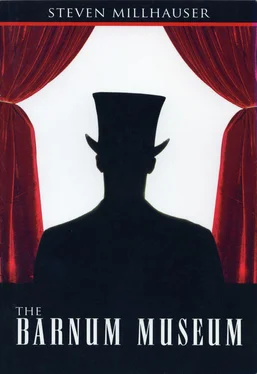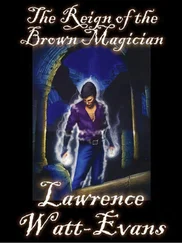On the night of February 14, 1902—a cold, clear night, when horseshoes rang sharply on the avenues, and fashionable women in chin-high black boas plunged their forearms into heavy, furry muffs — twelve uniformed policemen took their seats in the audience of Eisenheimhaus. The decision to arrest the Master during a performance was later disputed; the public arrest was apparently intended to send a warning to devotees of Eisenheim, and perhaps to other magicians as well. Immediately after the appearance of Rosa, Herr Uhl left his box. Moments later he strode through a side door onto the stage and announced the arrest of Eisenheim in the name of His Imperial Majesty and the City of Vienna. Twelve officers stepped into the aisles and stood at attention. Eisenheim turned his head wearily toward the intruding figure and did not move. Elis and Rosa, who had been standing at the edge of the stage, began to look about fearfully: the lovely boy shook his head and murmured “No” in his angelic voice, while Rosa hugged herself tightly and began to hum a low melody that sounded like a drawn-out moan or keen. Herr Uhl, who had paused some ten feet from Eisenheim in order to permit the grave Master to rise unaided, saw at once that things were getting out of hand — someone in the audience began murmuring “No,” the chant was taken up. Swiftly Uhl strode to the seated magician and placed a hand on his shoulder. That was when it happened: his hand fell through Eisenheim’s shoulder, he appeared to stumble, and in a fury he began striking at the magician, who remained seated calmly through the paroxysm of meaningless blows. At last the officer drew his sword and sliced through Eisenheim, who at this point rose with great dignity and turned to Elis and Rosa. They looked at him imploringly as they wavered and grew dim. The Master then turned to the audience; and slowly, gravely, he bowed. The applause began in scattered sections and grew louder and wilder until the curtains were seen to tremble. Six officers leaped onto the stage and attempted to seize Eisenheim, who looked at them with an expression of such melancholy that one policeman felt a shadow pass over his heart. And now a nervousness rippled through the crowd as the Master seemed to gather himself for some final effort: his face became rigid with concentration, the famous vein pressed through his forehead, the unseeing eyes were dark autumn nights when the wind picks up and branches creak. A shudder was seen to pass along his arms. It spread to his legs, and from the crowd rose the sound of a great inrush of breath as Eisenheim began his unthinkable final act: bending the black flame of his gaze inward, locked in savage concentration, he began to unknit the threads of his being. Wavering, slowly fading, he stood dark and unmoving there. In the Master’s face some claimed to see, as he dissolved before their eyes, a look of fearful exaltation. Others said that at the end he raised his face and uttered a cry of icy desolation. When it was over the audience rose to its feet. Herr Uhl promptly arrested a young man in the front row, and a precarious order was maintained. On a drab stage, empty except for a single wooden chair, policemen in uniform looked tensely about.
Later that night the police ransacked the apartment with a distant view of the Danube, but Eisenheim was not there. The failed arrest was in one respect highly successful: the Master was never seen again. In the Devil’s Factory trick mirrors were found, exquisite cabinets with secret panels, ingenious chests and boxes representing high instances of the art of deception, but not a clue about the famous illusions, not one, nothing. Some said that Eisenheim had created an illusory Eisenheim from the first day of the new century; others said that the Master had gradually grown illusory from trafficking with illusions. Someone suggested that Herr Uhl was himself an illusion, a carefully staged part of the final performance. Arguments arose over whether it was all done with lenses and mirrors, or whether the Jew from Bratislava had sold his soul to the devil for the dark gift of magic. All agreed that it was a sign of the times; and as precise memories faded, and the everyday world of coffee cups, doctors’ visits, and war rumors returned, a secret relief penetrated the souls of the faithful, who knew that the Master had passed safely out of the crumbling order of history into the indestructible realm of mystery and dream.












